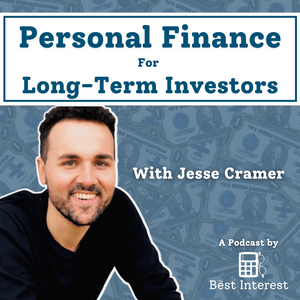Jesse tackles six thoughtful listener questions spanning a range of personal finance topics. He begins with a question about using Social Security and pension payments as a means to replace bonds in a retirement portfolio. Why do we own bonds, anyway? Then Jesse dives into long-term care insurance, a common sticky topic for aging retirees. Do they need to earmark dollars for long-term care? Next, he covers the taxation and distributions of inheritance assets, including sub-topics like probate, beneficiaries, trusts, and general estate planning tactics. He then covers equity compensation, breaking down RSUs, ISOs, NSOs, and ESPPs, and offers best practices for tax planning, diversification, and aligning with long-term goals. Mike then asks whether to invest $200,000 in cash currently sitting in a money market fund; Jesse outlines rational reasons for holding cash but warns against market timing, instead recommending a disciplined monthly investment plan. Finally, Paul inquires about the interaction between RMDs and sequence of returns risk, and Jesse reassures that while the concern is valid, proper planning—including Roth conversions, diversified withdrawals, and long-term strategy—can neutralize the potential damage. Key Takeaways: • Diversify your exposure—holding too much company stock can increase risk, so it’s often wise to sell and reinvest elsewhere once vesting or exercise occurs. • Planning ahead can reduce reliance on penalties or rigid strategies—consider building a taxable or Roth account alongside retirement funds. • Investors tend to lose more trying to time downturns than they do by staying invested through them. • Your plan should balance growth and stability, aiming to avoid forced sales in down markets while still meeting long-term goals. Key Timestamps: (00:00) - Diversification and Bonds in Retirement Portfolios (07:47) - Expectations for Stocks vs. Bonds (11:08) - Long-Term Care Insurance Deep Dive (25:08) - Taxation and Distribution of Inheritance Assets (38:49) - Revocable vs. Irrevocable Trusts: Control and Tax Implications (41:12) - Trust Distribution and Taxation (45:19) - Equity Compensation: RSUs, ISOs, NSOs, and ESPPs (51:49) - Best Practices for Managing Equity Compensation (59:28) - Market Timing and Cash Management Strategies (01:07:25) - RMDs and Sequence of Returns Risk Key Topics Discussed: The Best Interest, Jesse Cramer, Wealth Management Rochester NY, Financial Planning for Families, Fiduciary Financial Advisor, Comprehensive Financial Planning, Retirement Planning Advice, Tax-Efficient Investing, Risk Management for Investors, Generational Wealth Transfer Planning, Financial Strategies for High Earners, Personal Finance for Entrepreneurs, Behavioral Finance Insights, Asset Allocation Strategies, Advanced Estate Planning Techniques Mentions: https://bestinterest.blog/asset-liability-matching-aligns-your-money-to-your-future/ https://bestinterest.blog/all-ask-me-anything-ama-episodes/ More of The Best Interest: Check out the Best Interest Blog at https://bestinterest.blog/ Contact me at
[email protected] Consider working with me at https://bestinterest.blog/work/ The Best Interest Podcast is a personal podcast meant for education and entertainment. It should not be taken as financial advice, and is not prescriptive of your financial situation.


